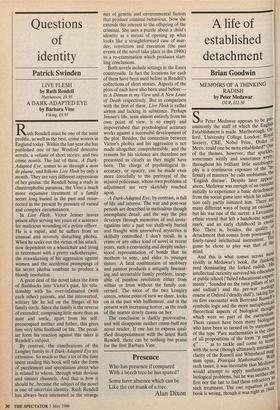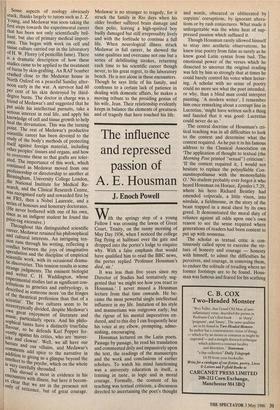A life of established detachment
Brian Goodwin
MEMOIRS OF A THINKING RADISH by Peter Medawar
OUP, £12.50
S. ir Peter Medawar appears to be pre- eminently the stuff of which the English Establishment is made. Marlborough, ox- ford, University College London; Royal Society, CBE, Nobel Prize, Order of Merit; could one be more established? One of the themes, however, that sparkles, sometimes wittily and sometimes wrY1Y' throughout his brilliant little autobiogra' phy is a continuous exposure of the in- firmity of manners' he calls snobismus, the 'English disease'. Despite later apPear" ances, Medawar was enough of an outsider initially to experience a basic detachment from the social game into which his educa. tion only partly initiated him. There are many different ways of being an outsider, but his was one of the surest: a Levantine ethnic strand that left a handsome semMr mark, and an early childhood in ex°tic Rio. There is, besides, the quality of detachment that comes from possessing 3 finely-tuned intellectual instrument. The game he chose to play was that of the mind. And this is what comes across 111.°st vividly in Medawar's book, the thinkin.g His reed dominating the forked radish. 4 intellectual curiosity survived his education at public school ('failed educational expert' ments', 'founded on the twin pillars of sex and sadism') and the pre-war zoolo.gY course at Oxford ('deadly dull'), taking fir,e on first encounter with Bertrand Russell! symbolic logic and the more metaphyslea,l; theoretical aspects of biological thougln which were no part of the curriculup. There cannot have been many biologists who have been so turned on by statements of the type 'Pure mathematics is the elss of all propositions of the form "p imPiles, 9" • . .' as to tackle and come to won! with the terse (though ultimately mistaken), clarity of the Russell and Whitehead rnal num opus, Principia Mathematica. such tastes, it was inevitable that Medayva'_ would attempt to apply mathematics the biological problems, but he was neither o first nor the last to find them refractory .tne such treatment. The one equation in t, A book is wrong, though it was right in 194' Some aspects of zoology obviously stuck, thanks largely to tutors such as J. Z. Young, and Medawar was soon taking the first steps towards the experimental career that has been not only scientifically bril- liant, but also of primary medical import- ance. This began with work on cell and tissue culture carried out in the laboratory of H. W. Florey (of penicillin fame). There IS a dramatic description of how these studies came to be applied to the treatment of burns by skin-grafting. An RAF bomber crashed close to the Medawar house in North Oxford on a peaceful Sunday after- noon early in the war. A survivor had 60 per cent of his skin destroyed by third- degree burns. The doctor in charge was a friend of Medawar's and suggested that he put aside his intellectual pursuits, take a serious interest in real life, and apply his knowledge of cell and tissue growth to help heal the devastation. This was the turning Point. The rest of Medawar's productive scientific career has been devoted to the study of the body's methods of protecting itself against foreign material, including other peoples' tissues and organs, and how to overcome these so that grafts are toler- ated. The importance of this work, which continued as Medawar moved from one Professorship or directorship to another at Birmingham, University College London, .the National Institute for Medical Re- search, and the Clinical Research Centre, was recognised early and rewarded first by an FRS, then a Nobel Laureate, and a series of honours and honorary doctorates. (He never bothered with one of his own, since as an indigent student he found the Pnee-tag excessive.) Throughout this distinguished scientific career, Medawar retained his philosophical and cultural interests. An intriguing ten- sion runs through his writing, reflecting a conflict between the joys of imaginative speculation and the discipline of empirical scientific work, with its occasional drama- tic discoveries. This tension results in some strange judgments. The eminent biologist and writer C. H. Waddington, whose experimental studies last as significant con- tributions to genetics and embryology, is described as someone more 'on the fringes of the theatrical profession than that of a scientist'. The two cultures seem to be stereotypically divided, despite Medawar's Own great enjoyment of literature and music, particularly opera. And his philo- s,„ophical tastes have a distinctly true/false flavour, so he defends Karl Popper fer- vently against his critics, who are 'maver- icks and clowns'. Well, we all have our heroes and our villains, and Medawar's comments add spice to the narrative in a ddition to giving us a glimpse beyond the intellect to the psyche, which on the whole ver., ..., carefully shrouded. This shroud is most in evidence in his encounters with illness, but here it becom- es _clear that we are in the presence not MY of reticence, but of great courage. Medawar is no stranger to tragedy, for it struck the family in Rio days when his older brother suffered brain damage and then polio, leaving a high-spirited boy badly damaged but still irrepressibly lively and with the fortitude to continue a full life. When neurological illness struck Medawar in full career, he showed the same qualities and overcame not one but a series of debilitating strokes, returning each time to his scientific career though never, to his great regret, to the laboratory bench. He is not alone in these encounters. Though he says little of his family, and confesses to a certain lack of patience in dealing with domestic affairs, he makes a moving tribute to the presiding genius of his wife, Jean. Their relationship evidently keeps in balance the elements of greatness and of tragedy that have touched his life.



















































 Previous page
Previous page